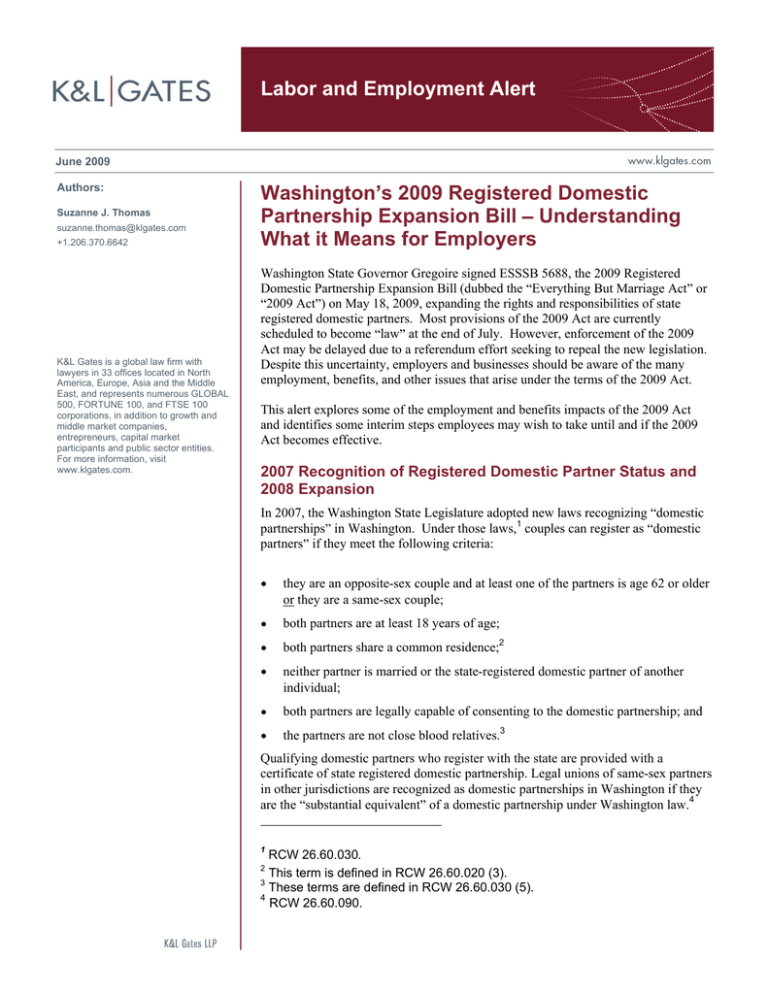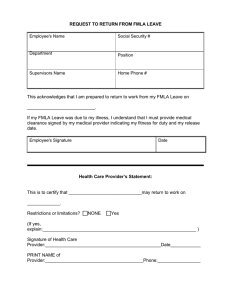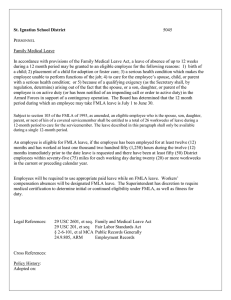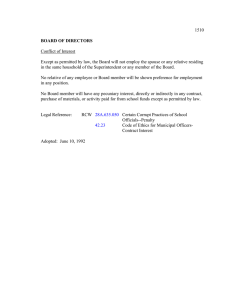
Labor and Employment Alert
June 2009
Authors:
Suzanne J. Thomas
suzanne.thomas@klgates.com
+1.206.370.6642
K&L Gates is a global law firm with
lawyers in 33 offices located in North
America, Europe, Asia and the Middle
East, and represents numerous GLOBAL
500, FORTUNE 100, and FTSE 100
corporations, in addition to growth and
middle market companies,
entrepreneurs, capital market
participants and public sector entities.
For more information, visit
www.klgates.com.
Washington s 2009 Registered Domestic
Partnership Expansion Bill Understanding
What it Means for Employers
Washington State Governor Gregoire signed ESSSB 5688, the 2009 Registered
Domestic Partnership Expansion Bill (dubbed the Everything But Marriage Act or
2009 Act ) on May 18, 2009, expanding the rights and responsibilities of state
registered domestic partners. Most provisions of the 2009 Act are currently
scheduled to become law at the end of July. However, enforcement of the 2009
Act may be delayed due to a referendum effort seeking to repeal the new legislation.
Despite this uncertainty, employers and businesses should be aware of the many
employment, benefits, and other issues that arise under the terms of the 2009 Act.
This alert explores some of the employment and benefits impacts of the 2009 Act
and identifies some interim steps employees may wish to take until and if the 2009
Act becomes effective.
2007 Recognition of Registered Domestic Partner Status and
2008 Expansion
In 2007, the Washington State Legislature adopted new laws recognizing domestic
partnerships in Washington. Under those laws,1 couples can register as domestic
partners if they meet the following criteria:
they are an opposite-sex couple and at least one of the partners is age 62 or older
or they are a same-sex couple;
both partners are at least 18 years of age;
both partners share a common residence;2
neither partner is married or the state-registered domestic partner of another
individual;
both partners are legally capable of consenting to the domestic partnership; and
the partners are not close blood relatives.3
Qualifying domestic partners who register with the state are provided with a
certificate of state registered domestic partnership. Legal unions of same-sex partners
in other jurisdictions are recognized as domestic partnerships in Washington if they
are the substantial equivalent of a domestic partnership under Washington law.4
1
RCW 26.60.030.
This term is defined in RCW 26.60.020 (3).
3
These terms are defined in RCW 26.60.030 (5).
4
RCW 26.60.090.
2
Labor and Employment Alert
Some existing Washington statutes were amended in
2007 to recognize certain domestic partner rights
and obligations, such as those associated with
hospital visitation, health care decision-making,
organ donation decisions, and other issues related to
illness, incapacity, and death. Because of the
volume of Washington laws that could be affected
by domestic partnership recognition, not all of
Washington s laws were amended in 2007 to
recognize the rights and responsibilities of registered
domestic partners. Additional domestic partner laws
were adopted in 2008, such as community property
rights, probate rights, and joint responsibility for
debts. Again, not all Washington laws impacted by
registered domestic partner status were amended.
privilege, immunity, right, benefit, or responsibility
granted or imposed by statute, administrative or
court rule, policy, common law or any other law to
an individual because the individual is or was a
spouse, or because the individual is or was an in-law
in a specified way to another individual, is granted
on equivalent terms, substantive and procedural, to
an individual because the individual is or was in a
state registered domestic partnership or because the
individual is or was, based on a state registered
domestic partnership, related in a specified way to
another individual. The provisions of this act shall
be liberally construed to achieve equal treatment, to
the extent not in conflict with federal law, of state
registered domestic partners and married spouses.
2009 Expansion of Registered
Domestic Partner Rights and
Responsibilities
Effectiveness and Effective Date of the
2009 Act
The purpose of the 2009 Act is to give Washington
State registered domestic partners all of the
responsibilities and rights that married couples have
in Washington, to the extent not in conflict with
federal law. Federal and Washington State laws
which prohibit same-sex marriage are not affected
by the 2009 Act.5 As the Legislature explained in
the 2009 Act:
It is the intent of the legislature that for all purposes
under state law, state registered domestic partners
shall be treated the same as married spouses. Any
5
ESSSB 5688. Same-sex marriage is prohibited
under federal law for all federal law purposes.
The Federal Defense of Marriage Act defines the
terms marriage and spouse as follows: the
word marriage means only a legal union between
one man and one woman as husband and wife,
and the word spouse refers only to a person of
the opposite sex who is a husband or a wife. 1
U.S.C. § 7. Washington law defines marriage as
a civil contract between a male and a female who
have each attained the age of eighteen years, and
who are otherwise capable. RCW 26.04.010 (1).
Washington s version of the Defense of Marriage
Act, which prohibits same-sex marriage in
Washington, remains in place. RCW 26.04.020
(c). Washington will not recognize a same-sex
marriage even if it is valid in another jurisdiction.
RCW 26.04.020 (3).
Most provisions of the 2009 Act are scheduled to go
into effect on July 26, 2009.6 However, a
Referendum to the People seeking to repeal the
2009 Act has been filed with the Secretary of State,
which may impact the effectiveness as well as the
effective date of the 2009 Act. The proponents of
this Referendum have until July 25, 2009 to submit
over 120,500 valid signatures to the Secretary of
State in order to place the repeal Referendum on the
November general election ballot. If the proponents
do not declare to have turned in sufficient signatures
by July 25, 2009, the 2009 Act will become law on
July 26, 2009. However, if the Referendum s
proponents turn in what they argue to be sufficient
signatures, the effective date of the 2009 Act will be
placed on hold until the signatures are counted. If
the count demonstrates that there are insufficient
signatures to place the Referendum on the
November ballot, the 2009 Act will become law
right away. If the count confirms that sufficient
signatures were turned in to place the repeal
Referendum on the November ballot, enactment of
the 2009 Act will be placed on hold pending the
outcome of the election. If the repeal is not
6
A few provisions relating to corrections
institutions would not go into effect until August 1,
2009. Other provisions, such as those relating to
certain state pensions, would not go into effect
until January 1, 2014.
June 2009
2
Labor and Employment Alert
successful, the 2009 Act would go into effect upon
certification of the election.
What kinds of laws are affected if the
2009 Act becomes law ?
A myriad of employment-related laws will be
affected if the 2009 Act becomes law. Much of the
2009 Act s implementation would be clear-cut. In
general, registered domestic partners would be
treated the same as married spouses for almost every
purpose, unless federal law requires otherwise. For
example, the Washington Family Leave Act
( WFLA ) requires an employer to allow an
employee to take leave to care for his or her spouse
with a serious health condition. This WFLA leave
runs concurrently with any leave the employee is
entitled to under the federal Family and Medical
Leave Act ( FMLA ). If the 2009 Act goes into
effect, an employee who is eligible for rights under
WFLA would be entitled to leave to care for that
employee s registered domestic partner with a
serious health condition, just like an eligible married
employee could take such leave to care for a spouse.
But WFLA and FMLA are not equivalent in all
respects. By definition, FMLA does not provide
coverage for domestic partner care leave, and it
prohibits designation of non-FMLA qualifying leave
as FMLA leave. Thus, WFLA leave to care for the
serious health care condition of a domestic partner
would be in addition to, not concurrent with, any
leave the employee would be entitled to under
FMLA.7
employers may choose to extend COBRAequivalent rights to domestic partners. Disparities
in treatment of spouses versus domestic partners
also exist under Flexible Spending Account plans.
For example, medical expenses of a non-dependent
domestic partner are not eligible for tax-free
reimbursement from an FSA, even if the employer
offers partner health insurance benefits.
Other technical traps for the unwary exist in
implementation of the 2009 Act. Using another
FMLA example, if an exempt employee takes
intermittent leave under the FMLA, the employer
can commensurately reduce pay without
jeopardizing the employee s exempt status under
the Fair Labor Standards Act.8 However, under the
federal regulations governing the FMLA, even if a
state requires leave that is similar to, but broader
than, FMLA, the employer cannot dock the
employee s pay for intermittent leave without
jeopardizing the employee s exempt status.9
A significant provision of the 2009 Act is its
requirement that insurance contracts issued in
Washington offer benefits to registered domestic
partners, although employers would not be required
to pay the premiums for such benefits.10 Many
group health plans that are not subject to state law primarily self-insured plans - would not be impacted
in the same way due to ERISA s exemption of
many such plans from state laws.11
8
29 CFR §825.206 (a).
29 CFR §825.206(c). An alternative is to
convert the employee to non-exempt status for
the period of such leave. Id.
9
Other federal laws also result in certain disparities in
treatment of domestic partners. For example,
although employer-provided health coverage for
different-sex spouses is excluded from an
employee s gross income, the fair market value of
domestic partner benefits is taxable income to the
employee (with some exceptions relating to
dependent status under IRS regulations). As a
result, an employee who elects domestic partner
coverage pays more income and payroll tax than a
similarly-situated married employee. Federal
COBRA rights are also available for spouses, but not
for domestic partners - even when the employersponsored plan covered such partners. However,
7
29 CFR §825.701 (3).
10
Note, though, if the employer pays for spousal
benefits, under the Washington Law Against
Discrimination (RCW 49.60 et seq.), an employer
may face disparate treatment or even disparate
impact discrimination claims if the premiums are
not likewise paid for registered domestic partners.
11
If the employer pays for married spouses under
a self-insured plan, but does not pay such
premiums for registered domestic partners, the
employer may face a discrimination claim. Such
claims may be subject to an ERISA preemption
argument, although the law in this area is an
ever-changing landscape.
June 2009
3
Labor and Employment Alert
Because Washington is a marital community state,
employment and business issues regarding marital
communities will also arise if the 2009 Act goes
into effect. For example, in Washington, an
employee s spouse needs to consent in order for
the employee to assign his or her wages.12 Consent
of an employee s spouse is necessary in certain other
contexts as well, such as for certain loan guarantees.
If the 2009 Act goes into effect, any time a spousal
consent is required, an equivalent domestic
partnership consent will be required.
These are only a handful of the many ways in which
the 2009 Act relates to employment and business in
general. Many other specific employment issues
regarding benefits, pensions and tax issues will need
to be carefully analyzed if the 2009 Act becomes
law.
For businesses and employers who wish to prepare
for possible implementation of the 2009 Act, we
suggest the following initial steps:
the 2009 Act, employers could be prepared to
post or distribute a simple notice on the
effective date of the 2009 Act while policy
revisions are under consideration. The notice to
employees could state: Recently, changes were
made to Washington law regarding the rights
and responsibilities of registered domestic
partners. We will comply with all such laws
and are working on revisions to our policies and
handbooks to reflect these changes. Please feel
free to direct any questions about domestic
partnership employment issues to ________ as
we work to update our policies.
As noted above, the impacts of the 2009 Act for
businesses and employers may be wide-ranging.
K&L Gates will continue to monitor the 2009 Act
and related developments. This alert is not
comprehensive and does not constitute legal advice.
All specific situations should be reviewed on a caseby-case basis.
Talk to your insurance broker. Employers who
offer state-regulated insurance coverage to
employees should check with their insurance
broker or carrier to determine what specific
impact the 2009 Act will have on their policies,
enrollment and related issues, and to be ready to
roll out coverage to registered domestic
partners if the 2009 Act becomes law.
Review handbooks and other policies. Periodic
review of handbooks or other policies is always
a good idea, particularly given this year s
amendments to the Americans with Disabilities
Act and the FMLA. Employers also need to
ensure that their anti-discrimination policies are
up to date. Review of such policies should be a
good tool to begin identifying areas where
updates would be necessary upon enactment of
the 2009 Act.
Draft a simple notice to distribute to employees
if the 2009 Act becomes law. Instead of
revising policies in advance of the enactment of
12
RCW 49.48.100.
June 2009
4
Labor and Employment Alert
Anchorage Austin Beijing Berlin Boston Charlotte Chicago Dallas Dubai Fort Worth Frankfurt Harrisburg Hong Kong London
Los Angeles Miami Newark New York Orange County Palo Alto Paris Pittsburgh Portland Raleigh Research Triangle Park
San Diego San Francisco Seattle Shanghai Singapore Spokane/Coeur d Alene Taipei Washington, D.C.
K&L Gates is a global law firm with lawyers in 33 offices located in North America, Europe, Asia and the Middle East, and represents numerous
GLOBAL 500, FORTUNE 100, and FTSE 100 corporations, in addition to growth and middle market companies, entrepreneurs, capital market
participants and public sector entities. For more information, visit www.klgates.com.
K&L Gates comprises multiple affiliated partnerships: a limited liability partnership with the full name K&L Gates LLP qualified in Delaware and
maintaining offices throughout the U.S., in Berlin and Frankfurt, Germany, in Beijing (K&L Gates LLP Beijing Representative Office), in Dubai,
U.A.E., in Shanghai (K&L Gates LLP Shanghai Representative Office), and in Singapore (K&L Gates LLP Singapore Representative Office); a
limited liability partnership (also named K&L Gates LLP) incorporated in England and maintaining offices in London and Paris; a Taiwan general
partnership (K&L Gates) maintaining an office in Taipei; and a Hong Kong general partnership (K&L Gates, Solicitors) maintaining an office in Hong
Kong. K&L Gates maintains appropriate registrations in the jurisdictions in which its offices are located. A list of the partners in each entity is
available for inspection at any K&L Gates office.
This publication is for informational purposes and does not contain or convey legal advice. The information herein should not be used or relied upon
in regard to any particular facts or circumstances without first consulting a lawyer.
©2009 K&L Gates LLP. All Rights Reserved.
June 2009
5




